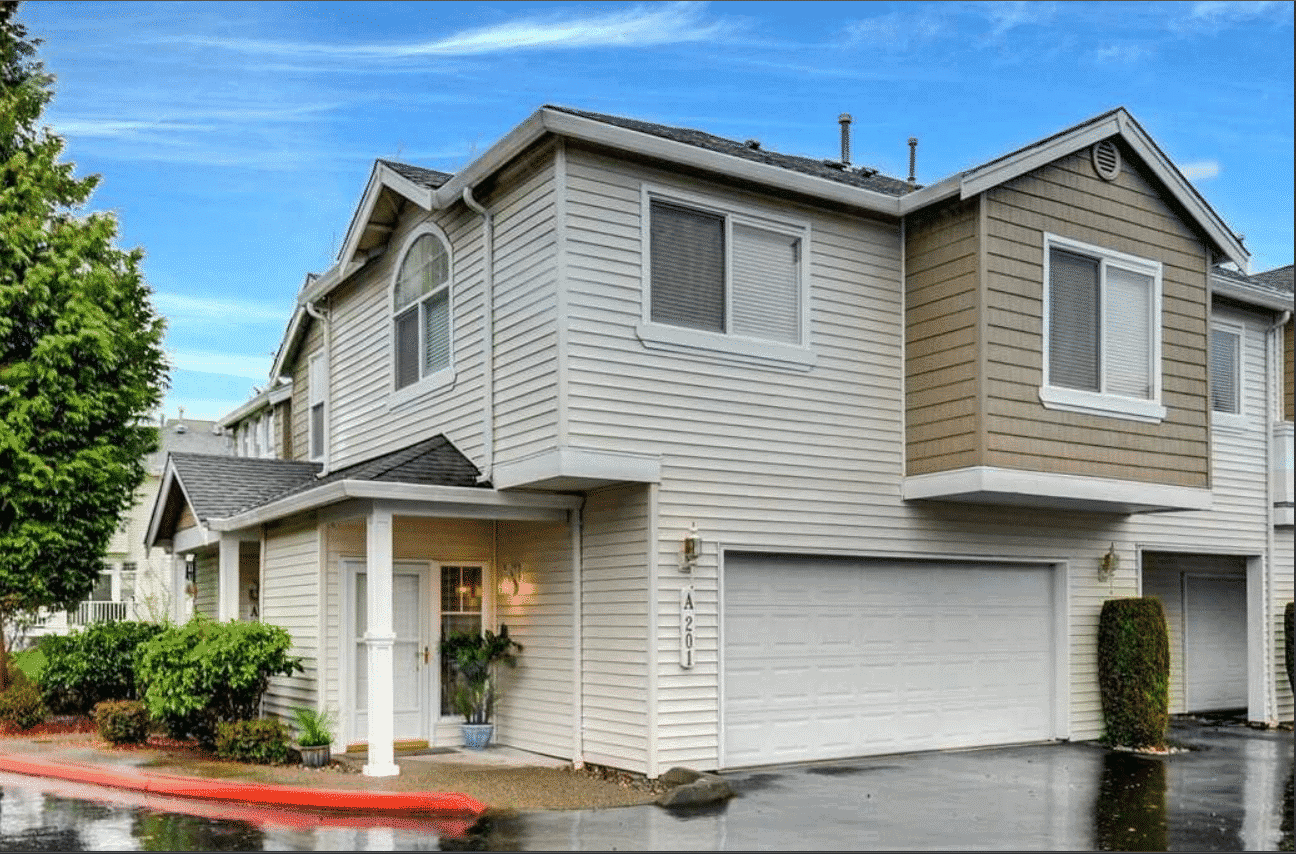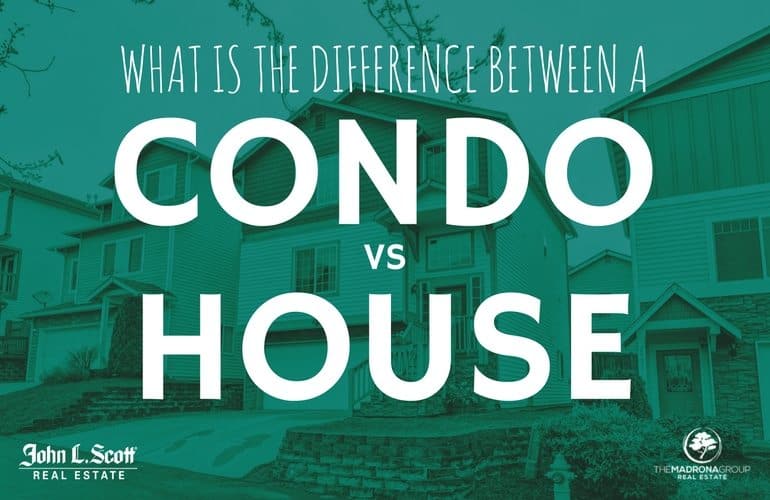People often think that the difference between a condo vs house is whether there is a yard
In this post, I will go through the differences between a Condo Vs House.
Here is a hint it is not whether it looks like an apartment or if it has a yard.
Most of us can identify the typical multi-unit attached condo complex that looks similar to an apartment building. But you may struggle with the detached condo with a yard and fence.
Although I will do my best to explain the difference between a house and a condo I am by no means an attorney and when in doubt check the title’s legal description.
The average price of a single-family home in Snohomish County is $763,441. The average price for a condo is $586,082 (January 2024)
VIDEO VERSION OF CONDO VS HOUSE
What Is A Condo: 00:57
Types of Condo: 01:43 - Attached Condo, Townhouse, Detached Condo
HOA: 02:45
5 THINGS TO CONSIDER WHEN DECIDING BETWEEN BUYING A CONDOMINIUM OR SINGLE FAMILY HOME
1. PRICE: 5:39
The most important factor when trying to decide between a condo vs house is the price. The average sales price for a home in Snohomish County is $550,867 A condo is $394,312 (August 2020 Infosparks NWMLS). A condo will come with HOA dues typically between $200-$500 month in Snohomish County. That will often time include water, sewer and garbage. The HOA dues go into a savings account and go towards fixing the big ticket items covered by the HOA, such as roof, siding, windows, foundation and fencing. Finally the annual taxes are generally lower on a condominium versus a house.
2. MAINTENANCE AND UPKEEP: 6:03
The 2nd most important factor is the amount of maintenance and upkeep you are comfortable with. With an attached condo you generally will not be responsible for anything outside the walls of your unit. That includes landscaping, driveways, exterior painting, patios & decks and all the work you would responsible for with a house.
3. PRIVACY: 6:25
If privacy is one of your top factors then a single family home may be the way to go. Attached condos and townhomes are going to be sharing at least 1 wall and up to 4 walls with your neighbor. And detached condos are generally zoned to be only about 5 feet apart.
4. RISK: 6:52
Condos do come with a bit of risk in the form of Special Assessments, HOA Management and potential lawsuits.
5. RESALE VALUE: 7:09
Single family homes tend to hold their resale value stronger than a condo.
What is a condo

The first thing to understand is that the word Condo refers to both a unit of ownership in a building and a legal form of ownership.
The concept of the Condo as we think of it today first appeared in Salt Lake City in 1960. In the 1960's and 70's Florida received a big rush of retirees. To take advantage developers there began to offer multi-unit buildings whose units could be owned outright, according to Mary Umberger.
'Condominium' refers to real property developments in which the property can be divided by lines on the ground like traditional real estate, but can also be divided with horizontal planes, like the floors of a building. The individual owners also each own an undivided (collective) interest in the common areas (i.e. offices, lobbies, elevators, hallways, parking garages, pools, etc.)Condolaw.net
In WA state condominiums created after July 1, 1990, are governed by the Condominium Act Chapter 64.34 RCW .
Before July 1, 1990, they are governed by the Condominium Act Chapter 64.32 RCW.
According to the new RCW, except as provided by the declaration:
The walls, floors, or ceilings are the boundaries of a unit, and all lath, furring, wallboard, plasterboard, plaster, paneling, tiles, wallpaper, paint, finished flooring, and any other materials constituting any part of the finished surfaces thereof are a part of the unit, and all other portions of the walls, floors, or ceilings are a part of the common elements.
Meaning that generally when you purchase a condo you own the walls, floor, ceiling, and air inside your condo. Everything outside of that area is the common area, that is collectively owned by all the individual owners of the units.
TYPES OF CONDO
The attached condo is what most of us think of when we hear the word condo. It is a multi-unit building usually with units stacked on top of one another and sharing at least 1 wall.
In this form of ownership, you would own and maintain the walls, floor, ceiling, and everything inside the space. The exterior walls and all other common areas would be owned and maintained collectively by the whole of
The Townhome is similar except that the units are not stacked on top of each other. They are condo units that share a sidewall.
Snohomish County defines Townhomes:
"Dwelling, Townhouse" ("Townhouse") means a single-family dwelling unit constructed in a group of three or more attached units in which each unit extends from the foundation to roof and has open space on at least two sides. The term includes a townhouse constructed as a zero lot line development and townhouse on single lot.
Detached condos are essentially single family homes in appearance. Generally, the owner is responsible for maintaining everything within the boundaries of the lot.
HOA
The condo form of ownership includes an HOA or Home Owners Association.
The common areas, amenities, and utilities are managed collectively by the owners. When you buy your condo you purchase the unit and a share of the common area.
Most condo associations are created as corporations. They must have a declaration also known as the CC+R’s (Covenants, Conditions, and Restrictions).
The goal of the CC+R’s is to preserve the community investment. For example requiring that your lawn is mowed, or restricting the color that you can paint a building or fence.
In addition to enforcing the “rules”, they are also responsible for maintaining the common areas of the complex. This may be repairing or replacing a roof, the landscaping of common areas, driveways or parking lots, insurance, or garbage pickup.
In order to pay for the maintenance of the common areas, the HOA sets monthly dues that each owner of the complex must pay. A well maintained HOA should carry a surplus of funds in case of emergency.
Typical monthly HOA dues can range from $30-500 a month.
Difference between Detached Condo vs Home
Condo vs House pros and cons
Your searching for homes on our website, or some other website and find a house you like with a yard and a fence. Then you look at the category and see that it is a condo.
Why?
Because it has an HOA. Not necessarily single family residential homes often have HOA’s.
In most cases, it is because the city has a very specific requirement for lot sizes in order for a home to be classified as single family detached. If a developer wants to build more units in a space they can build them as condos.
As the seller of the Condo vs House the motivation is additional profit. But before you get to upset remember there is an upside for you as well. The detached condo is more affordable.
People will pay more money for a detached condo that resembles a house as opposed to an attached condo or townhome and the builder can build more units.
As a buyer of a condo vs house, you can get a nice size home with a small yard for less money because it is a "condo". Often with these types of developments, the monthly HOA dues are minimal.
Generally, with this type of detached condo, the owner will be responsible for the maintenance of everything within the border of the lot. Giving it the feel of a house, with a slightly lower price tag.
When trying to decide between buying a Condo vs House I think the most important factor is Price.
All things being equal a Condo will cost less than a house.
The HOA does not really increase the price of home ownership as it often includes utilities you will pay more for as a residential home owner. It also generally includes maintenance of big ticket items such as; roof, siding, windows, and balconies and decks.
In addition the property taxes are generally lower for condos vs houses.
Which brings us to the 2nd most important factor when deciding, Maintenance and Upkeep.
Generally speaking a residential home will include a yard that will need to be maintained along with all the big ticket items previously mentioned.
If you are concerned with maintenance and upkeep than you should consider a condo.
Money, time and effort are all on the side of the condo. Why would you buy a house?
I think the most motivating factor is Privacy. Buying a house will give you more privacy than a condo. An attached condo will share a minimum of one wall, up to 2 walls, the ceiling nd the floor with your neighbors.
A zero lot line detached condo will not share a wall. However, in some cases each unit only needs to be 5 five from the next unit.
Condos can come with a bit of Risk in the form of Major Assessments, delinquent dues and law suits.
Finally, you should consider Re-Sale Value. Generally, a stand alone residential house will provide the strongest long term Re-Sale Value.
SUMMARY of CONDO VS HOUSE
The purpose of this article is to help clarify the difference between detached condos and houses.
Often times it is hard to distinguish whether a property is a townhome, condo or single family detached house.
You can generally tell by looking for the category on whatever site you are searching on, asking your real estate agent, or checking on the title legal description.
The main difference between a detached condo and a house is simply the legal classification. If the developer wanted to build more units in the amount of space they had to build they may have designated them condos.
When deciding which would better suit your needs you should consider; Price, Maintenance and Upkeep, Privacy, Risk and Re-Sale Value.
If you would like more information about the difference between Condominiums and Single-Family Houses contact Joe or Jason.
To see available Condo inventory in Snohomish County: Snohomish County Condos For Sale
Although I have done my best to explain the difference between a condo and a house, I am not a real estate attorney. You should consult with an attorney before making any legal decision.
Share this post!




